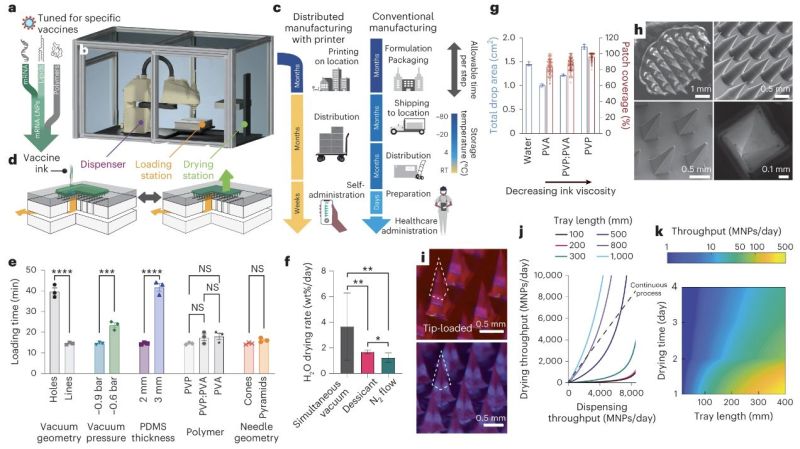A Microneedle Vaccine Patch Printer for Thermostable mRNA Vaccines

What if you could get vaccinated with the ease of putting on an adhesive bandage? This is the promise of microneedle patches (MNP), which are essentially what they sound like. These would also have uses in diagnostics that might one day obliviate the need for drawing blood. The one major issue with MNPs is their manufacturing, which has been a laborious and highly manual process. In a recent paper in Nature Biotechnology researchers detail the construction and testing of a MNP printer, or microneedle vaccine printer (MVP) that can print dissolving polymers containing stabilized mRNA vaccine.
These mRNA strands are as usual encapsulated in a liquid nanoparticle container, which is mixed with the soluble and biocompatible polymer. This mixture is then added to a mold and dried, after which it retains the microneedle structure of the mold. On tests involving pig skin, the MNPs were capable of penetrating the skin and delivering the vaccine contained in the needles. Produced patches were shown to be shelf-stable for at least six months, which would make these ideal for vaccine distribution in areas where refrigeration and similar are problematic.
Using MNPs for delivering vaccines has previously been researched for e.g. delivering rotavirus and poliovirus vaccine, and a 2021 study in Nature Biomedical Engineering looked at the viability of using MNPs to rapidly sample protein biomarkers in interstitial fluid, which could make diagnostics for certain biomarkers as uncomplicated as putting on the patch, removing it and examining it, removing the need for drawing blood or sampling large amounts of interstitial fluid for external analysis.
If the concept of the MVP and similar MNP printers can be commercialized, it might make it possible to strongly shorten the supply chain for vaccines in less developed regions, while also enabling diagnostics that are very costly and cumbersome today.
from Blog – Hackaday https://ift.tt/e5Er8Km
Comments
Post a Comment